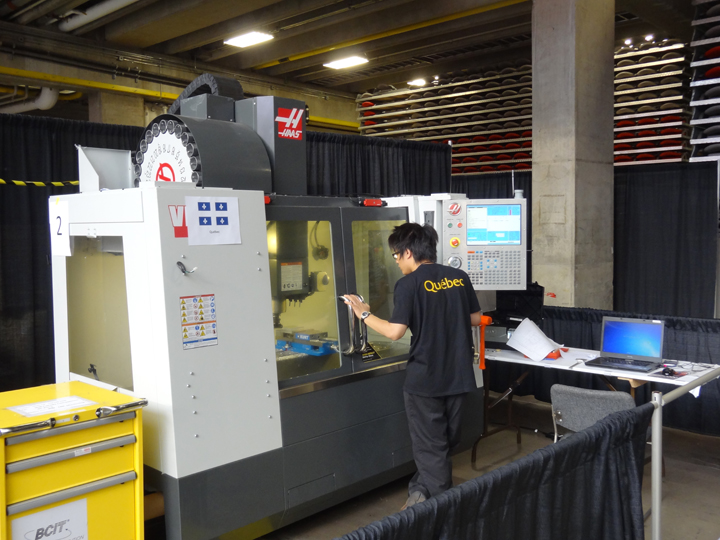
A competitor from Quebec in the CNC Machining competition works on a Haas VF-2.
TORonTO — A recent survey by the Canadian Education and Research Institute for Counselling (CERIC) suggests that Canadian employers are split on how to address the skills gap facing the countrys industrial sector.
Environics Research Group conducted the telephone survey of 500 Canadian business leaders about the skills shortage and skills gaps, employee training and recruiting workers, as well as career management practices.
While there are many challenges facing employers, one of the more commonly cited ones is a shortage of skilled workers. The survey suggests that a shortage of skilled workers is a challenge for 7 in 10 businesses across the country right now.
Clearly, Canadian business leaders are very concerned about their need for skilled people and the talent disconnect that is happening, said Mark Venning, chair of the CERIC board of directors.
They need additional tools and expertise when it comes to recruiting new employees and helping all their employees achieve their career goals.
The survey found that a majority of executives (72 per cent) perceive a gap between the skills they are looking for, and what most jobseekers have. More than one in three businesses (36 per cent) feel that gap has grown. Executives in organizations with over 500 employees are the most likely (51 per cent) to say that the skills gap has increased in recent years.
Among Canadian businesses, there is an even split between those who feel the best way to close the gap is for employers to provide more training (43 per cent), and those who say it is prospective employees who should better prepare themselves for the labour market (43 per cent).
According to the CERIC survey, a total of 70 per cent of Canadian executives say finding a skilled employee is not an easy task, with one quarter describing it as very difficult. For businesses located outside of Ontario, that challenge is even greater and, as a result, many rely on referrals from current employees and internal promotions to fill positions.
Nearly two-thirds of executives say they would hire an employee with the right soft skills and provide training on the more technical aspects of the job. Yet two out of three businesses (66 per cent) have difficulty finding candidates with the soft skills theyre looking for a positive attitude, good communication ability and a strong work ethic.
Although willingness to provide training is high, a majority of employers (64 per cent) also express concern about losing employees after investing in training.
When it comes to recruiting, just half of Canadian executives (52 per cent) say that a potential employees online footprint is important to them, with only one in 10 (11 per cent) saying it is very important. Small businesses (of less than 10 employees) are the least likely to consider a potential employees online profile just over one quarter (26 per cent) say it is not at all important. Seventy-six per cent of executives said resumes are still important, while an additional 10 per cent see resumes as having become more important.
Canadian executives were also asked about their organizations efforts to recruit candidates from under-represented groups, such as visible minorities, aboriginal people, people with disabilities and new Canadians; half (50 per cent) say that this is not something in which they invest a great deal of time or effort.
The survey was conducted October 25 to November 11, 2013 and has a margin of error is plus or minus 4.4 percentage points (at the 95 per cent confidence level). The sample included representation across regions, urban vs. rural, number of employees and by industry.
The CERIC is a charitable organization that advances education and research in career counselling and career development.
www.ceric.ca




